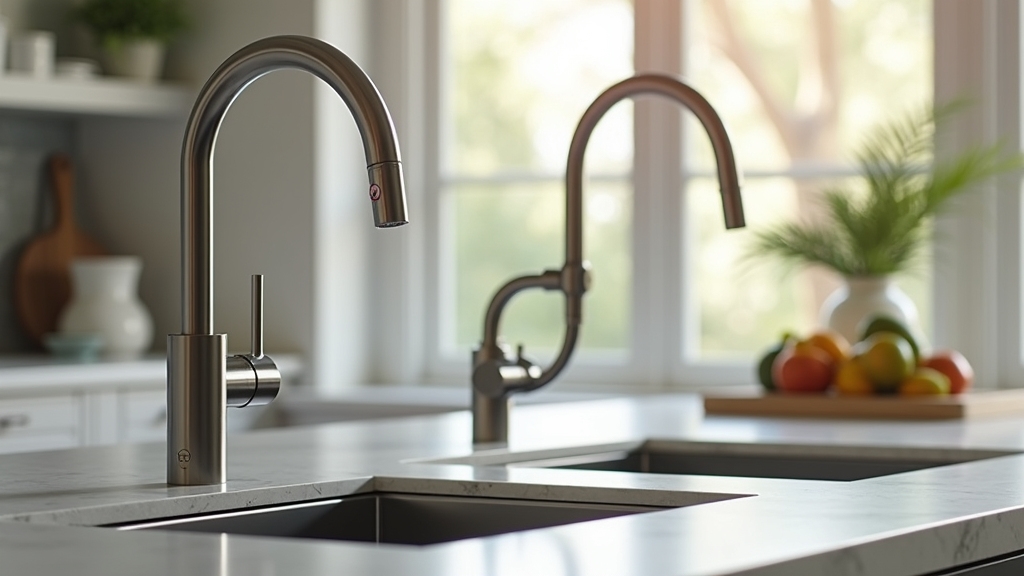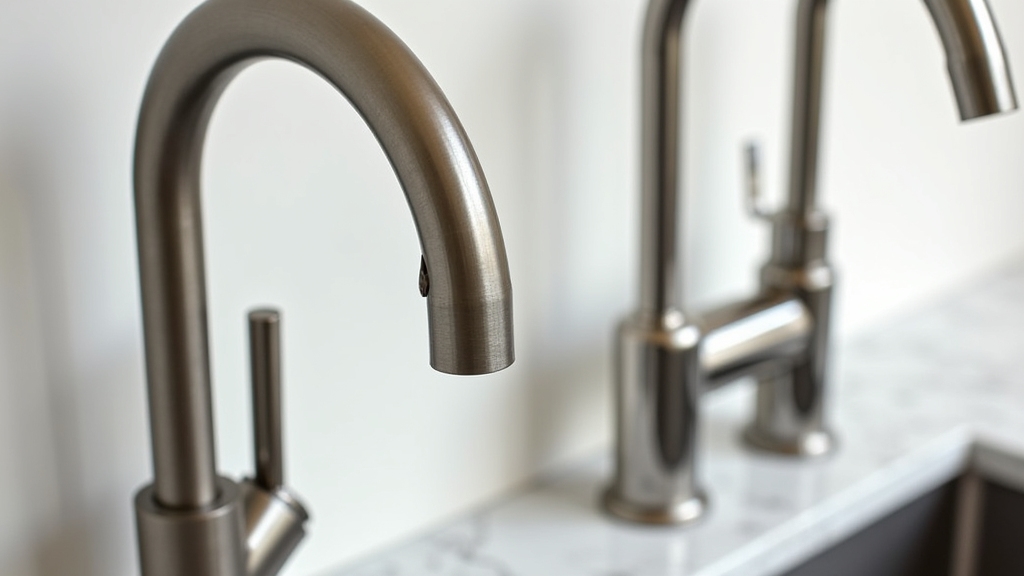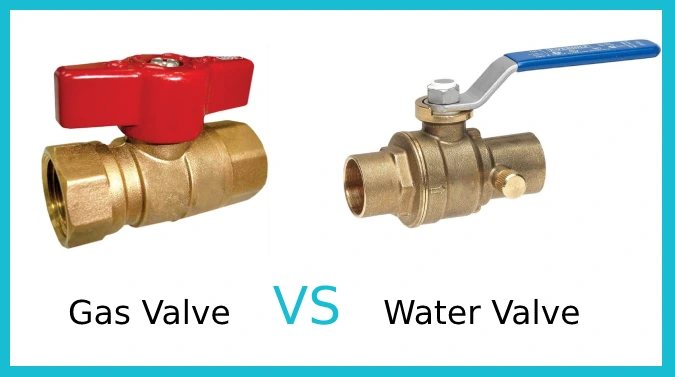When choosing between Delta and Pfister faucets, you’ll find Delta offers modern designs with advanced tech like Touch2O® sensors and diamond-coated valves for durability and leak prevention.
Pfister caters to those preferring classic styling and straightforward reliability at a budget-friendly price. Both provide durable materials, but Delta leans toward innovation and sleek finishes, while Pfister emphasizes practical ease and traditional appeal.
Exploring their differences can help you select the best fit for your needs.
- GUARANTEED QUALITY: Quality is our top priority, so all our bathroom sink faucets are tested and…
- EASY DIY INSTALLATION: Wrench-free, quick-connect hose audibly clicks when water lines are connected…
- RELIABLE VALVE: Valve cartridge is tested to last at least 500,000 uses to ensure high performance…
- WIDESPREAD BATHROOM SINK FAUCET – Features two handles and a spout; fits sinks or vanity…
- PUSH & SEAL DRAIN – Simply press to seal and again to open; guaranteed tight seal each and every…
- QUICK TO INSTALL – Pfast Connect reduces installation time and guarantees a secure connection to…
Key Takeaways
- Delta faucets feature modern designs and advanced tech like Touch2O, while Pfister offers traditional styling with straightforward, budget-friendly options.
- Delta uses Diamond Seal Technology and Spot Defense finishes for enhanced durability; Pfister focuses on solid construction and easy maintenance.
- Pfister simplifies installation with QuickConnect and Push & Seal, whereas Delta offers tool-free mounting and integrated supply lines for error-free setup.
- Consumer choice depends on style preference, budget, and desired features: Delta suits tech-savvy users; Pfister appeals to those seeking classic, economical faucets.
Delta Faucets vs Pfister: Complete Feature Comparison
| Feature | Delta Faucets | Pfister Faucets |
|---|---|---|
| Design Style | Modern, sleek with clean lines | Classic, traditional with elegant curves |
| Technology | Touch2O®, Diamond Seal, H2Okinetic® | Push & Seal™, QuickConnect, ceramic disc valves |
| Price Range | Higher-end pricing for premium features | Budget-friendly with solid quality |
| Finish Options | Wide variety including spot-resistant stainless | Standard finishes: chrome, brushed nickel, bronze |
| Installation | Tools-free installation, MagnaTite Docking | Quick Install technology, push-and-seal assemblies |
| Water Efficiency | WaterSense certified, up to 20% water savings | Meets standard efficiency requirements |
| Best For | Tech-savvy users wanting modern innovation | Traditional homeowners seeking reliable basics |
| Durability Features | Diamond-coated valves, integrated supply lines | Ceramic disc valves, TiteSeal design |
| Maintenance | Touch-Clean spray holes, self-cleaning features | Easy maintenance with user-friendly repairs |
Brand History and Market Position
How did Delta Faucet Company establish itself as a leader in the faucet industry? You’ll find its foundation in 1954 when Alex Manoogian developed the first successful washerless ball valve faucet, introducing a breakthrough in faucet technology. The company name, Delta, reflects the triangular internal cam shape resembling the Greek letter delta.
Starting with kitchen faucets, Delta expanded into bath faucets by the 1960s and grew sales to nearly $4 million by 1958. The company’s dedication to quiet operation and user-friendly designs contributed greatly to its early success.
You’ll see that Delta consistently advanced technology, pioneering innovations like single-handle washerless faucets, ScaldGuard pressure balance, and the MagnaTite Docking system. Additionally, Delta introduced ShieldSpray® Technology to clean with laser-like precision while containing mess and splatter.
The brand’s market position strengthened through expanded manufacturing, strategic partnerships, and direct consumer marketing. By the late 20th century, Delta secured its presence in over one million U.S. homes and 55 countries.
Delta’s commitment to innovation and quality helped it maintain a competitive edge in the faucet industry. Its focus on user-friendly designs and durability continues to resonate with consumers globally.
Design and Aesthetic Differences
You’ll notice Pfister leans toward classic, timeless designs with traditional curves. These designs evoke a sense of elegance and enduring style. Price Pfister features classic, timeless designs with traditional aesthetics, subtle curves, and elegant lines, which contribute to their overall appeal. When selecting fixtures, familiarize with pump components to ensure compatibility with your existing setup.
In contrast, Delta emphasizes sleek, modern styles featuring clean lines and innovative finishes. Their designs are tailored for a contemporary look. Delta is recognized for modern, sleek styles with clean lines and contemporary looks.
Both brands offer multiple finish options to suit various tastes. Pfister provides a range of traditional finishes that complement their classic designs.
Delta includes advanced finish choices like spot-resistant stainless steel and champagne bronze. These options enhance the faucet’s contemporary appeal. Understanding these design and finish distinctions helps you select a faucet that aligns with your aesthetic and functional preferences.
Classic vs Modern Styles
When choosing between Delta and Pfister faucets, understanding their distinct design philosophies helps clarify which style suits your space.
Pfister faucets emphasize classic, timeless designs with elegant lines and gentle curves, ideal for traditional or transitional interiors. You’ll find ornate handles and traditional spout shapes that offer warmth and heritage appeal. They also offer a variety of finishes such as polished chrome and oil-rubbed bronze to complement diverse tastes.
In contrast, Delta focuses on modern, minimalist aesthetics with sleek geometric forms and streamlined profiles. Their faucets often feature high-arc spouts and integrate advanced technologies like Touch2O, influencing both form and function.
If your design favors sophistication and innovation, Delta’s contemporary style fits best. Conversely, if you prefer enduring elegance with proven materials and subtle detailing, Pfister suits classic tastes.
Finish Options Variety
Following the choice between classic and modern styles, finish options play a significant role in defining the final look and durability of your faucet. Delta offers a broader range, including spot-resistant stainless, matte chrome, and specialty finishes like Brilliance® Pearl Nickel. Most of these finishes are produced using Delta’s proprietary Brilliance process, which ensures high durability and resistance to corrosion and tarnishing through advanced protective coatings. These finishes resist corrosion and tarnishing through proprietary technology. They complement Delta’s sleek, contemporary designs and incorporate features like Touch2O technology for durability and ease of maintenance. Additionally, choosing products with durable material construction enhances the overall longevity and maintenance ease of your fixtures.
Pfister, by contrast, provides a narrower selection focusing on polished chrome, brushed nickel, and oil-rubbed bronze. These finishes align with traditional aesthetics. While Pfister’s finishes are durable, they lack the advanced protective coatings found in Delta’s line. However, their classic tones remain a popular choice for blending subtly into traditional or transitional spaces.
Technology and Functional Features

Although both Delta and Pfister faucets deliver reliable performance, Delta distinguishes itself with advanced valve technologies and sensor-based features that enhance durability and user convenience. However, improper continuous use without following operational guidelines may reduce the lifespan of these components.
Delta’s Diamond Seal Technology and Touch2O® sensor enable precise control, reduced wear, and hygienic operation. These innovations contribute to a longer product lifespan and ease of use.
Pfister focuses on reliable ceramic valves and manual controls without sensor integration, offering straightforward functionality without electronic components.
Delta also leads in spray and water-efficiency innovations, such as Touch-Clean spray holes and WaterSense certification, which improve maintenance and conservation efforts. Its faucets often include built-in water supply lines that minimize leaks and simplify maintenance.
Pfister provides features like Spot Defense finish and standard flow control, emphasizing durability and simplicity.
Materials and Construction
When evaluating faucet durability, the materials and construction methods used by Delta and Price Pfister play a crucial role in their long-term performance.
Delta faucets feature solid brass bodies with patented technologies like DIAMOND™ Seal and Spot Defense finishes. These innovations enhance corrosion resistance and reduce leak points, extending faucet lifespan and maintaining appearance despite frequent use and mineral buildup.
Note that manufacturers typically maintain consistent product quality across different retail channels, ensuring reliability regardless of where the faucet is purchased. Proper installation and maintenance also help prevent issues such as water hammer that can impact faucet longevity.
Price Pfister also employs brass construction, integrating ceramic disc valves under the Pforever Seal brand to ensure leak-free durability.
Both brands use robust metals and finishes, such as chrome and brushed nickel, to resist tarnishing. Their engineering addresses wear from water hardness and pressure fluctuations. While Delta focuses on advanced sealing and structural reinforcement, Pfister emphasizes practical durability with easier maintenance.
Leak Prevention Technology
Although both Delta and Price Pfister offer reliable faucets, their approaches to leak prevention technology differ markedly.
Delta’s patented Diamond Seal® Technology incorporates diamond components to double valve life and minimize leaks. This is complemented by integrated supply lines for error-free installation. Proper installation and maintenance play a crucial role in ensuring long-term performance and leak prevention.
Pfister uses Push & Seal™ and QuickConnect Technology to streamline sealing and connections. Additionally, their TopPfit® design allows above-sink installation, reducing stress on water lines and preventing potential leaks. Ensuring compliance with local building codes can further enhance the durability and safety of faucet installations.
Delta’s harder valve materials resist wear, especially in hard water, ensuring durable seals over time. In contrast, Pfister designs components for easy maintenance and user repairs, making it simple to address leaks if they occur.
Delta’s magnetic docking spray heads reduce mechanical wear, further preventing leaks. The Cassidy pulldown faucet’s Magnatite docking keeps the spray head securely in place, enhancing leak prevention. Both brands emphasize installation accuracy, but Delta focuses on pre-assembled parts to simplify the process.
Pfister, meanwhile, provides extensive installation support to ensure proper setup. Overall, you can expect Delta faucets to maintain leak-free operation longer, while Pfister facilitates straightforward leak management when needed.
Pricing and Value Considerations
Since price often guides purchasing decisions, understanding the cost and value differences between Delta and Pfister faucets is crucial.
Pfister faucets appeal if you prioritize affordability without sacrificing basic quality. They offer durable, straightforward functionality at a lower price point. With 74 different Pfister faucet products available, customers can find a wide variety of options tailored to their needs. Water-powered sump pumps are an example of a more affordable option that requires minimal maintenance.
Delta’s higher prices correspond to advanced technology and premium materials. For example, Delta integrates innovations like Touch2O and ShieldSpray, which justify the higher costs for tech-savvy users. Additionally, Delta’s premium materials aim for an extended lifespan, potentially reducing long-term repairs.
Style and finish variety also affect perceived value. Delta leans toward a modern aesthetic, while Pfister favors classic designs. Choosing between them depends on your budget, desired features, and aesthetic preference, ensuring you get the best value for your specific needs.
Installation and Compatibility Insights
When installing Delta or Pfister faucets, you’ll find both brands prioritize user-friendly designs that simplify setup and maintenance. Pfister’s Quick Install technology reduces complexity, while Delta offers tools-free installation for straightforward mounting. Both provide detailed guides to minimize professional help.
Additionally, Pfister products are noted for being easy to install and cost-effective, catering well to DIY enthusiasts. Understanding the importance of proper installation can significantly extend the lifespan of your faucet components.
Pfister’s push-and-seal drain assemblies and Delta’s MagnaTite Docking enhance installation and post-installation ease. These features make it simpler to secure components without hassle. Compatibility-wise, Pfister faucets work with Delta valves, allowing mixed setups.
However, some parts like diverter cartridges don’t interchange without modification. Both adhere to standard plumbing measurements, ensuring broad compatibility. However, removing certain spouts may require special tools or heat application. Detailed tutorials assist with troubleshooting, but professional advice may be needed for complex retrofits.
Consumer Preferences and Usage Scenarios
Understanding installation and compatibility highlights how Delta and Pfister faucets function mechanically, but consumer choices often hinge on design preferences and practical usage.
You’ll find Pfister appealing if you prefer classic, traditional styling with straightforward operation and budget-friendly pricing. Delta suits you if you want modern aesthetics combined with advanced tech features like Touch2O and temperature-indicating LEDs.
Usage scenarios further refine choices:
- Pfister fits traditional or rental homes needing economical, reliable faucets.
- Delta excels in tech-friendly, high-use kitchens requiring hygiene and efficiency.
- Families benefit from Delta’s safety features and touchless control.
- Maintenance preferences vary: Pfister favors simplicity; Delta offers low-wear, easy-clean innovations.
Ultimately, your selection depends on balancing style, technology, price, and daily function. Additionally, considering consumer safety precautions during installation and use can enhance long-term satisfaction and prevent issues.
Frequently Asked Questions
Which Brand Offers Better Customer Service Support?
You’ll find Pfister generally offers better customer service support, with more responsive and helpful interactions, especially during installation and troubleshooting. While Delta’s support is solid, with clear policies and effective handling, Pfister tends to provide a slightly more attentive experience.
Both brands prioritize customer satisfaction, but if promptness and personalized assistance matter most to you, Pfister’s service often edges out Delta’s in user feedback and professional evaluations.
Do Delta or Pfister Faucets Have Eco-Friendly Water-Saving Options?
You’ll find Delta faucets offer superior eco-friendly water-saving options, reducing water use by up to 20% through patented H2Okinetic® technology.
Their WaterSense-labeled models limit flow rates to 1.5 gallons per minute, saving an average family 700 gallons annually. Pfister meets standard water efficiency norms but lacks advanced features like touch-activated controls or droplet shaping.
Are There Any Known Issues With Either Brand’s Faucet Handles?
Yes, you might notice handle issues like leaks or looseness with both Delta and Pfister faucets. Delta commonly faces cartridge wear causing leaks and handle looseness from set screw wear. Pfister’s problems likely mirror these issues due to mineral buildup and wear.
You’ll want to regularly tighten screws, clean mineral deposits, and replace cartridges or seats as needed. Proper maintenance, including lubrication, helps keep handles turning smoothly.
How Do Delta and Pfister Faucets Perform in Hard Water Areas?
You’ll find both Delta and Pfister faucets handle hard water well, but with different strengths. Delta’s Diamond Seal Technology and Touch-Clean spray heads resist mineral buildup and leaks effectively.
Pfister’s ceramic disc valves and TiteSeal design minimize wear and staining from minerals. Both offer durable finishes suited for harsh water. If you want advanced water-saving with hard water resistance, Delta excels, while Pfister provides reliable, low-maintenance performance.
Ready to Upgrade? Your Next Steps for Faucet Shopping
You might think choosing between Delta and Pfister faucets is as simple as flipping a switch, but it’s anything but. While Delta dazzles with cutting-edge tech and sleek designs, Pfister holds its ground with solid durability and budget-friendly options.
So, whether you crave innovation or reliability, you’re stuck weighing pros and cons like a faucet engineer. In the end, your perfect pick depends less on brand hype and more on what your sink really needs.
- GUARANTEED QUALITY: Quality is our top priority, so all our kitchen sink faucets are tested and…
- SINGLE HOLE INSTALLATION: Fits 1 or 3-hole 8 in. center installations with optional deck plate…
- POWERFUL SPRAY: ShieldSpray Technology cuts through stubborn messes with a powerful stream of water…
- Pforever Seal – advanced single contol ceramic disc valve technology with a never leak guarantee
- Spout swivels 360 degrees for maximum maneuverability
- Installs with or without deckplate
Last update on 2026-03-02 / Affiliate links / Images from Amazon Product Advertising API







